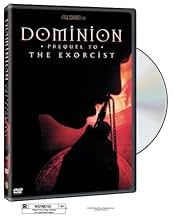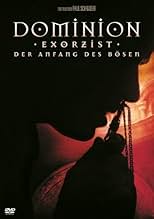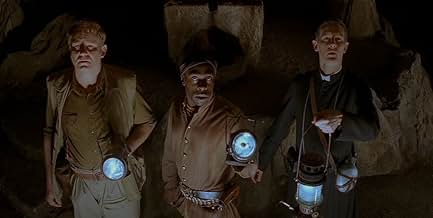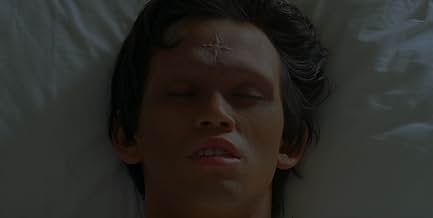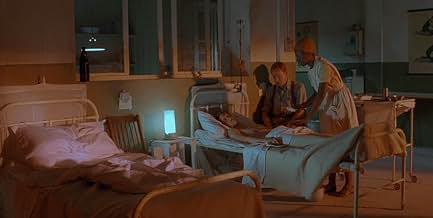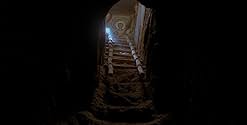Decades before Father Merrin helped save Regan MacNeil's soul, he first encounters the demon Pazuzu in Kenya. Merrin's initial battle with Pazuzu leads to the rediscovery of his faith.Decades before Father Merrin helped save Regan MacNeil's soul, he first encounters the demon Pazuzu in Kenya. Merrin's initial battle with Pazuzu leads to the rediscovery of his faith.Decades before Father Merrin helped save Regan MacNeil's soul, he first encounters the demon Pazuzu in Kenya. Merrin's initial battle with Pazuzu leads to the rediscovery of his faith.
- Awards
- 3 nominations total
Israel Oyelumade
- Jomo
- (as Israel Aduramo)
Griet van Damme
- Teenage Dutch Girl
- (as Griet Van Damme)
- Director
- Writers
- All cast & crew
- Production, box office & more at IMDbPro
Featured reviews
Set in 1947, after surviving an encounter with Nazis in occupied Holland during World War II where he was forced to decide who would live and die (shattering his faith in the process), Father Lankester Merrin (Stellan Skarsgard) is on sabbatical from the Church having spent the intervening years as an archeologist at various digs in Africa. As Merrin excavates the remains of a Byzantine Christian church in the Turkana region of British Kenya, he is reluctantly directed by Major Granville (Julian Wadham) the overseer of the region to take along Father Francis (Gabriel Mann) to ensure the religious aspects of the find are respected. As the dig proceeds Merrin begins sparking the ire of the Turkana elders who are adherents of the old ways and believe the Church is cursed. Merrin also helps a physically deformed and mute outcast named Cheche (Billy Crawford) who has been shunned by the Turkana and hopes to help him with doctor Rachel Lesno's (Clara Bellar) assistance. As the site gets further excavated, an air of evil becomes to overtake the atmosphere.
Following the critical and commercial disappointment of the troubled production of Exorcist: The Beginning (in which nearly all of original director Paul Schrader's work was scrapped so Renny Harlin could produce an allegedly more "commercial" product), Morgan Creek met with Schrader about allowing him to assemble his own cut of the movie so it could be given a limited release. The studio only allocated $35,000 for the cut which meant that scoring, ADR, and the cinematographer couldn't be brought back meaning finding workarounds. The film was given a limited release of just only 100 theaters with little marketing, and went largely ignored at the box office making around $250,000. While critical reception was slightly improved from the Harlin version (with the exception of Exorcist author William Peter Blatty who warmly received it) many critics had the issue of a lack of fear from the film with its focus being more on a character piece. Dominion is a very flawed film undeniably, but it's also an ambitious one that for my money is worth a viewing.
With Schrader at the helm, the opening sequence where we see Merrin's encounter with the Nazis rather than the over the top crusader massacre of Exorcist: The Beginning is a much stronger opening as it creates a dramatic throughline for Merin as he struggles with the nature of evil as a grounded real-life presence in the world rather than an abstract demonic entity. This allows Merrin's experiences to come through more completely as he finds himself confronting a similar type of situation later in the film that helps build his arc in comparison to Exorcist: The Beginning where it was just sprinkled throughout randomly without much thought. The movie also features some different approaches to the supporting cast which make them feel more fully rounded as characters in comparison to Harlin's cut. Father Francis for instance (this time played by Gabriel Mann) is now something of a counterpoint to Merrin's character as we see him shaken in his faith from the same evil that drove Merrin away and he conveys that sense of tragedy quite nicely. We also have Billy Crawford as Cheche who wasn't in the Harlin cut and he gives much more emotional investment to the film than a character who served a similar purpose.
In many ways you can see Dominion as a complete flipside to Exorcist: The Beginning including the fact that where The Beginning was filled with over the top excess trying (and failing) to scare you, Dominion really is more of a slow burn drama that has a supernatural undercurrent rather than overt horror. Given the time the film was made in horror history where the output consisted of new "extreme" horror, polished Platinum Dune remakes, and Americanized remakes of Asian Horror popularized by The Ring, Dominion simply wouldn't have flown with mainstream audiences in a pre-A24 enviroment. That's not to say Dominion is on the level of an A24 film because it does have some undeniable issues such as the very flat "economical" post work that often makes the film feel more like an HBO 90s TV movie rather than a proper theatrical film which is no doubt a result of Morgan Creek refusing to authorizing funds to polish the end result. And while Dominion features less of the terrible CGI work in Exorcist: The Beginning, it still does rear its head even if there's less of it.
Dominion: Prequel to the Exorcist is a flawed film that doesn't reach the level of The Exorcist or even Exorcist III, but if audiences are willing to forgive the more sparing approach to its take on horror, fear, and evil they'll find an ambitious if lowkey character study with some actual ideas that makes up for its lack of polish. A marked improvement from the bombastic and empty excess of Exorcist: The Beginning.
Following the critical and commercial disappointment of the troubled production of Exorcist: The Beginning (in which nearly all of original director Paul Schrader's work was scrapped so Renny Harlin could produce an allegedly more "commercial" product), Morgan Creek met with Schrader about allowing him to assemble his own cut of the movie so it could be given a limited release. The studio only allocated $35,000 for the cut which meant that scoring, ADR, and the cinematographer couldn't be brought back meaning finding workarounds. The film was given a limited release of just only 100 theaters with little marketing, and went largely ignored at the box office making around $250,000. While critical reception was slightly improved from the Harlin version (with the exception of Exorcist author William Peter Blatty who warmly received it) many critics had the issue of a lack of fear from the film with its focus being more on a character piece. Dominion is a very flawed film undeniably, but it's also an ambitious one that for my money is worth a viewing.
With Schrader at the helm, the opening sequence where we see Merrin's encounter with the Nazis rather than the over the top crusader massacre of Exorcist: The Beginning is a much stronger opening as it creates a dramatic throughline for Merin as he struggles with the nature of evil as a grounded real-life presence in the world rather than an abstract demonic entity. This allows Merrin's experiences to come through more completely as he finds himself confronting a similar type of situation later in the film that helps build his arc in comparison to Exorcist: The Beginning where it was just sprinkled throughout randomly without much thought. The movie also features some different approaches to the supporting cast which make them feel more fully rounded as characters in comparison to Harlin's cut. Father Francis for instance (this time played by Gabriel Mann) is now something of a counterpoint to Merrin's character as we see him shaken in his faith from the same evil that drove Merrin away and he conveys that sense of tragedy quite nicely. We also have Billy Crawford as Cheche who wasn't in the Harlin cut and he gives much more emotional investment to the film than a character who served a similar purpose.
In many ways you can see Dominion as a complete flipside to Exorcist: The Beginning including the fact that where The Beginning was filled with over the top excess trying (and failing) to scare you, Dominion really is more of a slow burn drama that has a supernatural undercurrent rather than overt horror. Given the time the film was made in horror history where the output consisted of new "extreme" horror, polished Platinum Dune remakes, and Americanized remakes of Asian Horror popularized by The Ring, Dominion simply wouldn't have flown with mainstream audiences in a pre-A24 enviroment. That's not to say Dominion is on the level of an A24 film because it does have some undeniable issues such as the very flat "economical" post work that often makes the film feel more like an HBO 90s TV movie rather than a proper theatrical film which is no doubt a result of Morgan Creek refusing to authorizing funds to polish the end result. And while Dominion features less of the terrible CGI work in Exorcist: The Beginning, it still does rear its head even if there's less of it.
Dominion: Prequel to the Exorcist is a flawed film that doesn't reach the level of The Exorcist or even Exorcist III, but if audiences are willing to forgive the more sparing approach to its take on horror, fear, and evil they'll find an ambitious if lowkey character study with some actual ideas that makes up for its lack of polish. A marked improvement from the bombastic and empty excess of Exorcist: The Beginning.
In all honesty, I have to say that between this work, and the Remy Harlin Exorcist prequel, the story is told, and told well. Unfortunately, you NEED to watch both versions in order to GET the whole story and see effects worth seeing.
I don't know which is worse, to make two versions of the same movie, and have them both fall short, or to have waited 30 plus years to get the story in the first place.
Either way, if you're an Exorcist fan, I highly recommend viewing both versions to get the whole picture.
It's neither worse, nor better than the Remy Harlin Version, and rates a 5.0/10 from...
the Fiend :.
I don't know which is worse, to make two versions of the same movie, and have them both fall short, or to have waited 30 plus years to get the story in the first place.
Either way, if you're an Exorcist fan, I highly recommend viewing both versions to get the whole picture.
It's neither worse, nor better than the Remy Harlin Version, and rates a 5.0/10 from...
the Fiend :.
I found it fascinating at first, but it then dwindles to a boring talkie with a bit of action now and then. There were no real scares and it wasn't really frightening or disturbing, as we've come to expect from Exorcist movies. The CGI effects were very stocky, especially the animals. The hyenas were so stocky it was like watching a video game. As the film progressed, I related less and less to it, and later, found it very boring.
I remember the first time I watched The Exorcist (1973) when I was a kid, it scared the hell out of me. By now I rewatched that movie alot of times and it's still a classic in the horror/possession genre. To know what happened before is a good idea for a movie. The first prequel they made, Exorcist The Beginning (2004) wasn't great at all, rather mediocre, and so when I read this version was better I got a bit excited. But the truth is that this movie isn't much better. The first half of the movie is interesting to watch, but as soon as the horror part should begin you immediately spot the awful special effects and horrific CGI's. When you compare a movie from 1973, with decent special effects, with a movie from 2005, or 32 years of advanced technology, then you can only conclude that this isn't good at all. The prequel for one of the best demonic possession movies deserves something better than this.
Much has been made of the peculiarly Kafka-esquire journey of 'Dominion': originally in the hands of the late John Frankenheimer, the 'Exorcist' prequel project was turned over to Paul Schrader, director/screenwriter best known for dark, gritty, existential dramas such as 'Taxi Driver,' 'Hardcore,' and 'Auto-Focus.' Schrader delivered a film allegedly close in spirit to the original, but the suits were unsatisfied, feeling that the film they'd been given lacked the necessary frights to please the current audience for horror films. As has been amply explained, the original 'Exorcist' was itself much less a horror film than a psychological drama, spare of excessive fun-house shock value, but the audience has changed--younger, dumber, and trained to expect cheap thrills--and the decision was handed down to re-tool the film to add more special effects and gore. Schrader refused, was fired and replaced by Renny Harlin, who re-shot the film almost entirely with a significantly revised story, several new actors and characters, and a decidedly less cerebral approach. But Schrader's film was already in the can, and horror purists and Exorcist junkies were left to wonder what might have been--if, for once, there might be a sequel/prequel that made genuine efforts to add to a story's mythic tradition rather than merely to exploit its notoriety to sell tickets and popcorn.
At last, we are able to weigh in on 'Exorcist prequel: take 1,' and while it certainly doesn't capture the original's aura of terror and dread, 'Dominion' reminds us that the most frightening terrors are in the subconscious and the imagination, and offers a more patient and believable glimpse into how Father Merrin first encountered the demon that would later find its way into a particular corner townhouse in Georgetown.
Schrader's direction--aided by the camera of legendary cinematographer Vittorio Storraro--is patient but not without scope. They frame the African hill country beautifully, and while things at times seem a bit too clean and tidy, I didn't consider the film 'slow.' Skarsgard's Merrin is essentially the same character as in 'Beginning,' and while he isn't inadequate, his performance may be a bit too restrained. As in the Renny Harlin cut, we are told that Merrin has left the priesthood out of guilt and anger at God over a particularly horrific confrontation with man's inhumanity to man in Nazi-occupied Holland near the end of WW II. More is made of this back-story in 'Dominion,' but Merrin's crisis of faith seems less palpable and torturous than that of Damien Karras in 'The Exorcist,' so that his re-conversion to belief doesn't register the expected intensity. Gabriel Mann appears as Father Francis (due to schedule conflicts with the re-shoot, he was replaced by James D'Arcy in 'The Beginning'), and his tender, almost androgynous demeanor makes him an endearing and appealing character. Clara Bellar appears as Rachel, a character entirely written out of 'The Beginning' and replaced with a sexier version of the same, played by Bond girl Isabella Scurupco. Bellar is more believable as a nurse in East Africa, and her back-story creates a connection with Merrin, but she still seems a bit out of place (though certainly far more appropriate to the story than her counterpart in 'The Beginning'). Julian Wadham reprises his role as a tormented British Major, to strong and believable effect. The climactic confrontation with Pazuzu is entirely different in this film, and far more believable (and chilling).
Nevertheless, there are some inconsistencies, and the framing of the exorcism scene lacks the intensity of the first film's, largely because the audience is never adequately introduced to the victim. A big part of what made 'The Exorcist' terrifying is that the audience is given the opportunity to watch the full transformation of a sweet, affectionate child into a bile-spitting, profane shell for a malevolent spirit. 'Dominion's victim is never fully introduced, and thus, the audience has less of an investment in his exorcism.
In the end, however, this film far exceeds the quality of the amusement-park silliness of 'The Beginning,' and while it's not likely to break the bank, it is certainly the most respectable of the films based on Blatty and Friedkin's original.
At last, we are able to weigh in on 'Exorcist prequel: take 1,' and while it certainly doesn't capture the original's aura of terror and dread, 'Dominion' reminds us that the most frightening terrors are in the subconscious and the imagination, and offers a more patient and believable glimpse into how Father Merrin first encountered the demon that would later find its way into a particular corner townhouse in Georgetown.
Schrader's direction--aided by the camera of legendary cinematographer Vittorio Storraro--is patient but not without scope. They frame the African hill country beautifully, and while things at times seem a bit too clean and tidy, I didn't consider the film 'slow.' Skarsgard's Merrin is essentially the same character as in 'Beginning,' and while he isn't inadequate, his performance may be a bit too restrained. As in the Renny Harlin cut, we are told that Merrin has left the priesthood out of guilt and anger at God over a particularly horrific confrontation with man's inhumanity to man in Nazi-occupied Holland near the end of WW II. More is made of this back-story in 'Dominion,' but Merrin's crisis of faith seems less palpable and torturous than that of Damien Karras in 'The Exorcist,' so that his re-conversion to belief doesn't register the expected intensity. Gabriel Mann appears as Father Francis (due to schedule conflicts with the re-shoot, he was replaced by James D'Arcy in 'The Beginning'), and his tender, almost androgynous demeanor makes him an endearing and appealing character. Clara Bellar appears as Rachel, a character entirely written out of 'The Beginning' and replaced with a sexier version of the same, played by Bond girl Isabella Scurupco. Bellar is more believable as a nurse in East Africa, and her back-story creates a connection with Merrin, but she still seems a bit out of place (though certainly far more appropriate to the story than her counterpart in 'The Beginning'). Julian Wadham reprises his role as a tormented British Major, to strong and believable effect. The climactic confrontation with Pazuzu is entirely different in this film, and far more believable (and chilling).
Nevertheless, there are some inconsistencies, and the framing of the exorcism scene lacks the intensity of the first film's, largely because the audience is never adequately introduced to the victim. A big part of what made 'The Exorcist' terrifying is that the audience is given the opportunity to watch the full transformation of a sweet, affectionate child into a bile-spitting, profane shell for a malevolent spirit. 'Dominion's victim is never fully introduced, and thus, the audience has less of an investment in his exorcism.
In the end, however, this film far exceeds the quality of the amusement-park silliness of 'The Beginning,' and while it's not likely to break the bank, it is certainly the most respectable of the films based on Blatty and Friedkin's original.
Did you know
- TriviaPaul Schrader was given no money for publicity or music production after Morgan Creek decided to release his version. He was also only given $35,000 for visual effects and post-production. Additionally, Morgan Creek chose the release date of May 20th, the weekend Star Wars, épisode III : La Revanche des Sith (2005) came out.
- GoofsIn the scene where the flag is being taken down and folded, "Taps" plays in the background. "Taps" is an American military song, and is not played by the British Army. "Last Post" would have been the appropriate music.
- Quotes
Father Lankester Merrin: I believed God let us decide between good and evil. I chose good. Evil happened.
- Crazy creditsAt the extreme end of the end credits, after the last production company logo has faded out and the screen is entirely black, a demon voice grumbles "I am perfection".
- ConnectionsEdited from L'Exorciste : Au commencement (2004)
- SoundtracksStardust Room
Produced by Mitchel J. Greenspan
Composed by Nic. tenBroek (as Nic tenBroek)
Published by Ocean Life Music, (BMI)
Music Consultant Richard DeMatteo
Lyrics & Vocals by Devon Loizeaux
American Music Company Inc.
Details
Box office
- Budget
- $30,000,000 (estimated)
- Gross US & Canada
- $251,495
- Opening weekend US & Canada
- $140,703
- May 22, 2005
- Gross worldwide
- $251,495
- Runtime
- 1h 57m(117 min)
- Color
- Sound mix
Contribute to this page
Suggest an edit or add missing content




